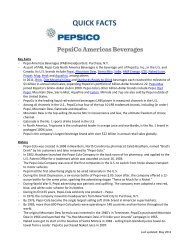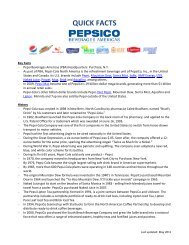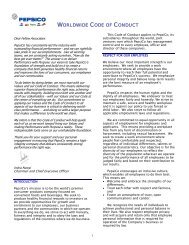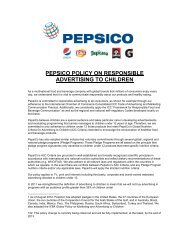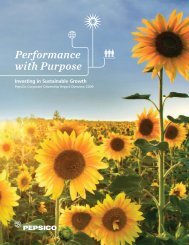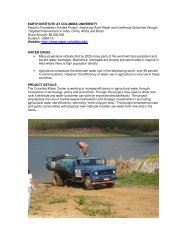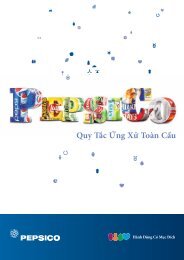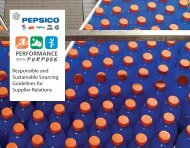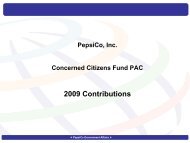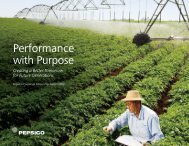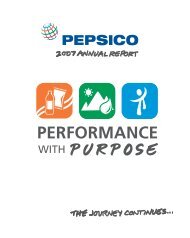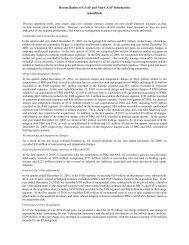Download our 2008 Sustainability Report Overview - PepsiCo
Download our 2008 Sustainability Report Overview - PepsiCo
Download our 2008 Sustainability Report Overview - PepsiCo
You also want an ePaper? Increase the reach of your titles
YUMPU automatically turns print PDFs into web optimized ePapers that Google loves.
WaterPioneering Initiatives to AchievePositive Water BalanceWater is required to make <strong>our</strong> products so that wemaintain the highest of quality standards for consumers —and water is required to ensure a clean and safe workplacefor <strong>our</strong> employees and <strong>our</strong> suppliers. In turn,efficient use of water across <strong>our</strong> operations is nothingshort of imperative. We are committed to minimizing<strong>our</strong> global water use through greater efficiency, innovativeprocesses and new technologies.In <strong>2008</strong>, we conserved more than 7.5 billion liters of wateras a result of gains in water efficiency from the 2006baseline. And while using water responsibly is a toppriority, we also believe in <strong>our</strong> ability to help address thebroader challenge of water scarcity and to help avoidwater conflicts in local communities.In India, all industry accounts for about 6% of total wateruse. Within that 6%, the soft drinks and bottled waterindustry accounts for about f<strong>our</strong>-hundredths of 1%.In comparison, agriculture accounts for over 80% of totalfresh water use in the country. To have significant impacton total water conservation, farming must use watermore efficiently. We believe we can play an importantrole in providing solutions.In 2003, <strong>our</strong> India team embarked on an ambitious j<strong>our</strong>neyto achieve positive water balance — giving back as muchas we take. Through a comprehensive program to conserveand optimize water usage, we have pioneered majorinitiatives by partnering with farmers, working withnumerous rural communities and establishing privatepublicpartnerships with Punjab Agriculture Universityand The Energy Res<strong>our</strong>ces Institute (TERI). We havecarried out a variety of innovative reuse and recyclinginitiatives within <strong>our</strong> own operations; raised farmproductivity, which increased farmers’ incomes; andimproved the quality of life in many communities. Theseinitiatives, among others, will help us make significantprogress toward positive water balance in 2009.In the last five years, <strong>our</strong> India manufacturing team hasreduced water use by more than 55% and in the lastthree years, we have saved more than 2.5 billion liters ofwater through conservation efforts. We have also preventeddepletion of groundwater aquifers by constructingrainwater harvesting systems in most of <strong>our</strong> plants.One of the most effective initiatives is <strong>our</strong> work withfarmers to reduce water intensity in rice cultivationthrough a method called direct seeding. Our India teamhas become a leading proponent of direct seedingof rice (versus transplanting seedlings from nurseries topaddies that are then flooded). While direct seedingof rice is done in some countries, it is not widely practicedin India.In India, <strong>PepsiCo</strong> has been experimenting with directseeding for f<strong>our</strong> years — testing methods to improve yieldand reduce weed growth and even developing a tractormounteddirect seeding machine, adjustable for seedvariety, planting depth and plant-to-plant spacing.After carrying out initial direct seeding trials at <strong>our</strong> ownmodel farms, pilot tests have been run in farmers’ fields toconfirm the results. In <strong>2008</strong>, direct seeding was extendedto more than 1,000 acres in five states and the initiativesaved close to 1 billion liters of water. In addition tosaving water, it also reduced costs by 1,400 rupees peracre for farmers.Direct seeding will go a long way in enabling <strong>our</strong> Indiateam to achieve positive water balance for <strong>our</strong> beveragebusiness by 2009. More important, it has the potentialto dramatically reduce water usage in a country wherewater is an increasingly precious commodity.This single initiative is an example of both climate changemitigation and adaptation. We are mitigating <strong>our</strong>impact on climate change by using significantly lessres<strong>our</strong>ces, and helping <strong>our</strong> farm communities adaptto the changing environment.In India, <strong>PepsiCo</strong> has been experimenting with direct seeding, one ofthe most effective ways to reduce water use in rice cultivation. Shown hereis a direct seeding machine, adjustable for seed variety, planting depthand plant-to-plant spacing.<strong>PepsiCo</strong> Corporate Citizenship <strong>Report</strong> <strong>2008</strong> 11



